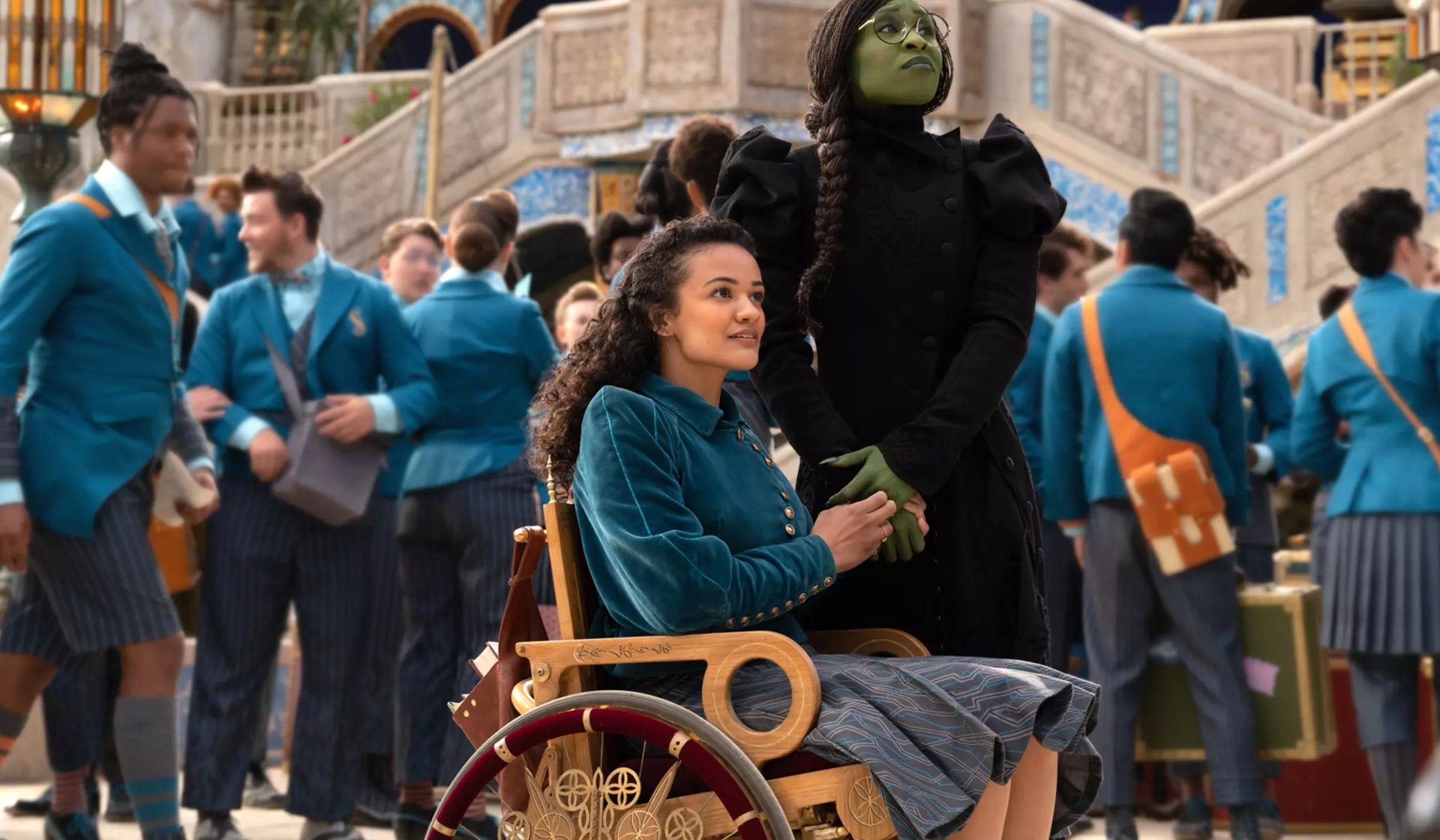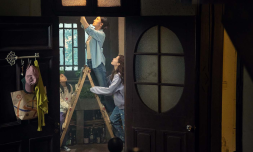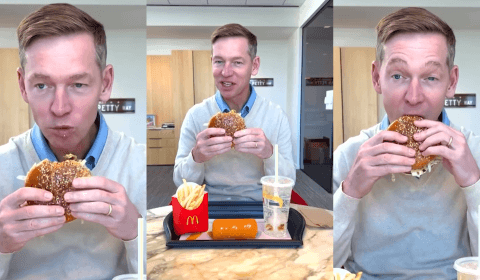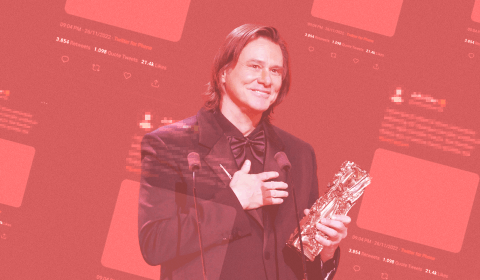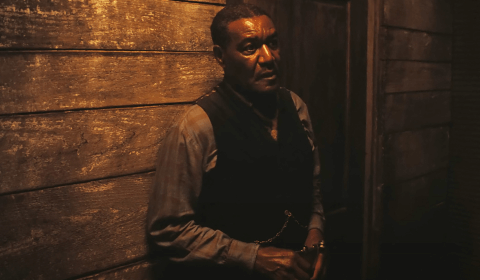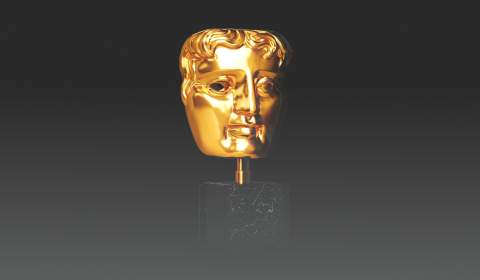Marissa Bode has called out ‘very gross’ comments about her ‘Wicked’ character Nessa Rose, as internet trolls prove that – despite growing representation – disabled individuals are still pushed to the fringes.
Unless you’ve been living under a rock, you’ll be well aware that Wicked, a movie adaptation of the award-winning Broadway show of the same name, is one of the most commercially successful films of 2024.
The glittering sets, showstopping musical numbers, and career-best performances have catapulted the cast to mega-stardom, and alongside a more than memorable press tour, ‘Wicked’ has quickly established itself in the cultural psyche.
So it’s no surprise that people are celebrating the film’s disabled representation, with wheelchair user Marissa Bode playing Nessa Rose – a significant disabled character who had previously only ever been played by able bodied actors.
But Bode’s historic casting has also brought a swathe of ableist comments on social media, highlighting the tenuous nature of inclusivity within mainstream media.
At just 24, Bode’s role as Nessa is first feature film debut. Her character is complex, layered, and often misunderstood, playing a central role in the plot of Wicked, particularly in the second act (which will be released in movie form next year).
It’s noteworthy that a disabled actor has been granted the opportunity to take on this kind of role, rather than being typecast as a two-dimensional individual meant to tick an inclusivity box.
It’s a shame that what a significant point in Bode’s career has been marred with offensive jokes and comments, which have targeted not just Nessa’s character, but Bode herself.
The actor recently spoke out against said remarks, labeling them ‘very gross’ and calling out those who attacked her lived experience as a disabled woman.
Despite accepting that audiences have every right to critique a fictional character, Bode asserted that ‘disability is not fictional’, and comments on her own situation as a wheelchair user cross a clear line.
‘It is absolutely OK to not like a fictional character’ Bode said on her TikTok account earlier this month, acknowledging the widespread dislike of Nessa (who’s questionable moral choices wreak havoc for other characters in the film).
‘Wicked and these characters and the movie wouldn’t be what it was if there weren’t different opinions on the characters and who’s truly wicked or not.’
@marissa_edob Representation is important but that’s not the only thing that will save the disabled community. I need a lot of y’all (non-disabled people) to do the work. To dissect and unlearn your own ableism. Listen to disabled people. Follow other disabled people outside of just me. Read up on the disability rights movement/watch the documentary Crip Camp! I understand no one likes feeling like they’re being scolded. But true progress never comes with comfort. And that’s ok. #wicked #nessa 💗💚
‘That being said,’ she continued, ‘aggressive comments and ‘jokes’ about Nessa’s disability itself is deeply uncomfortable because disability is not fictional. At the end of the day, me, Marissa, is the person that is still disabled and in a wheelchair. And so, it is simply low-hanging fruit that too many of you are comfortable taking.’
Bode also admitted at the time that she was ‘literally shaking a little bit’ because of how scared she was to publicly address the online comments.
Her words – and reaction to speaking them – expose the pervasive and consistent marginalisation of disabled individuals, even in spaces meant to celebrate them.
The decision to cast Bode was rightly celebrated, and marked an industry step forward in acknowledging the important of authentic representation and granting disabled voices a platform in Hollywood.
But authenticity in casting doesn’t guarantee authenticity in audience reception. Not to mention the fact that the overwhelming response to Bode’s casting proves how lackluster disabled representation is in general.
Jibes at Nessa’s wheelchair don’t just target a fictional character. As Bode points out, these comments uphold a culture of othering disabled individuals. This culture uses disability as a punchline rather than a point of empowerment, and forces people like Bode to educate their own critics.
The need for better representation of disabled people in media is nothing new. But as Bode’s experience reveals, putting a disable actor in a high-profile role – in one of the most successful films of the last few years, no less – will not necessarily foster true acceptance or change.
If anything ‘Wicked’ has spotlighted the fragile progress made in the fight for disability inclusion. For every applauding fan and critic, there’s always a torrent of resistance from those who still see disability as as symbol of weakness rather than an aspect of human diversity.
Bode’s decision to speak out is a powerful act of defiance and self protection. But it’s disappointing that she felt the need to do so at all. We need to be having these conversations every day, all the time, to ensure representation and progression is more than skin deep.
The burden of advocacy too often falls on the shoulders of those already marginalised, meaning actors like Bode take on a great deal of emotional labour when entering the public sphere.
Cultural shifts are needed to ensure ableism is considered as unacceptable as any other form of discrimination. That means addressing how disabled individuals are depicted on screen and, crucially, how those portrayals are received off-screen.
Film studios, streaming platforms, and social media companies wield immense power in shaping public perception. So they need to take responsibility for not only elevated diverse stories but moderating the vitriol that too often comes with them.









